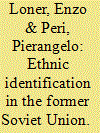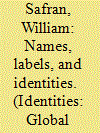|
|
|
Sort Order |
|
|
|
Items / Page
|
|
|
|
|
|
|
| Srl | Item |
| 1 |
ID:
126964


|
|
|
|
|
| Publication |
2013.
|
| Summary/Abstract |
This study, based on analysis of survey data collected in 2011 in Taiwan and Hong Kong, shows that cultural identification explains the choice of country and national identities and that Chinese nationalism emerges as an important factor connecting the minds of people in mainland China, Taiwan, and Hong Kong.
|
|
|
|
|
|
|
|
|
|
|
|
|
|
|
|
| 2 |
ID:
115050


|
|
|
|
|
| Publication |
2012.
|
| Summary/Abstract |
This paper examines the relationship between ethnic configuration and state social policy in a Chinese context. Why did the Chinese communist government have to implement a preferential policy towards ethnic minorities, and to what extent has this policy come to reshape peoples' consciousness of their group membership? As well as analysing the reasons and intents of the Chinese Communist Party when dealing with the minority issue before and after it attained power, this paper argues that categorizing of the population served to establish the state apparatus. Why the project of ethnic identification was first initiated in Fujian (a province best known for its overwhelming Han culture) is also discussed. By unfolding the process of searching for ethnic representation in Fujian in the early 1950s, this paper further argues that the major concern of the party-state regarding ethnic minorities is to hold onto its power. Finally, this paper documents how government agents, when investigating ethnicity, interacted with the local population. The Fujian case implies as well as exemplifies how ethnicity can be invented, constructed or reconstructed as a particular representation in relation to state formation.
|
|
|
|
|
|
|
|
|
|
|
|
|
|
|
|
| 3 |
ID:
090843


|
|
|
|
|
| Publication |
2009.
|
| Summary/Abstract |
The article seeks to 'measure' the concept of 'identification as titular' in regard to the members of five ethnic groups in the former Soviet Union (Bashkirs, Karels, Komis, Tatars and Yakuts) and the factors which strengthen, or conversely weaken, such identification. In order to do this it uses multigroup confirmatory factor analysis and multigroup structural equation modelling. Identification is mainly associated with a sense of national superiority and duration of residence in the home republic. The pattern among Yakuts, however, differs from that of the other ethnic groups and would require further detailed analysis.
|
|
|
|
|
|
|
|
|
|
|
|
|
|
|
|
| 4 |
ID:
084959


|
|
|
|
|
| Publication |
2008.
|
| Summary/Abstract |
This article addresses a relatively unexplored topic: the meaning and use of names and labels for ethnies and nations. It has been said (by Anthony Smith and others) that a nation is a "named" ethnic community. In the same sense, an ethnie is a "named" categoric group. The labeling of an ethnic or national categoric group by the group is often a self-conscious political act of identification reflecting its image and self-image and serving a variety of purposes: the achievement of collective self-respect, self-legitimation, adaptation and assimilation, differentiation, and self-exclusion, just as labeling by others is associated with legitimation or de-legitimation and positive or negative discrimination. The assigning of ethnonyms is a function of the sociopolitical context, ideology, and public policy.
|
|
|
|
|
|
|
|
|
|
|
|
|
|
|
|
| 5 |
ID:
160025


|
|
|
|
|
| Summary/Abstract |
For a few decades, socio-cultural as well as linguistic anthropologists have worked hard to construct a reliable semiotic paradigm to study linguistic, cultural and social interactions. These subfields – linguistic, cultural and social – are often analytically tackled asunder, though they are intimately interconnected, intertwined and overlapping. The semiotic theory of culture is not a novel discovery in itself, but it can also be applied to the study of society and ethnicity. Culture, society and ethnicity are systems of communication, that is systems of signs; society is a system of signs whose meaning emerges from social interactions and ethnicity a system of signs whose meaning is strategically imposed by a specific society through a specific culture. Moreover, those three systems of communication, of signs, are interconnected in various ways. This essay will analyze ‘Taiwanese Ethnicity’ in its semiotic dimension, and explore how society, culture and ethnicity interact in constructing an ethnic identification.
|
|
|
|
|
|
|
|
|
|
|
|
|
|
|
|
| 6 |
ID:
165167


|
|
|
|
|
| Summary/Abstract |
This article studies the conditions that lead peripheral minorities to identify with the state, their ethnic group, or neighboring countries. We contribute to research on separatism and irredentism by examining how violence, psychological distance, and national status determine identification. The analysis uses data from a novel experiment that randomized videos of actual violence in a large, representative survey of the Kashmir Valley region in the Indian state of Jammu and Kashmir, an enduring site of separatist and irredentist conflict. We find that a strong regional identity is a counterweight to irredentism, but violent repression by the state can push members of the minority to identify with an irredentist neighbor. Violence increases perceived distance from the nation and reduces national identification. There is suggestive evidence that these effects are concentrated among individuals with attributes that otherwise predict higher levels of identification with the state. Information about integrative institutions and increased national status brought about by economic growth is insufficient to induce national identification in a context where psychological distance from the nation is large.
|
|
|
|
|
|
|
|
|
|
|
|
|
|
|
|
| 7 |
ID:
116636


|
|
|
|
|
| Publication |
2012.
|
| Summary/Abstract |
It remains unknown if theoretical perspectives concerning party identification can be usefully applied to the formation or consolidation of state identification. Taiwan presents a unique case for exploring the nature of state identification, not only because of the ambiguity concerning its official name, but because its citizens have been struggling with a hard choice between Chinese identification, an identification based on cultural heritage that is considered to be the root of its legitimacy, and an emerging national identification with an independent Taiwan which is beginning to consolidate. Theoretical work is needed to explain the nature and the volatility of state identification in the light of conventional wisdom about party identification. This study concentrates on clarifying the relationships between party identification, national/ethnic identification, and state identification. It will show how these concepts are interwoven and how the idea of a "state identification crisis" originated. It will also shed light on studies about conflict process and political psychology.
|
|
|
|
|
|
|
|
|
|
|
|
|
|
|
|
|
|
|
|
|